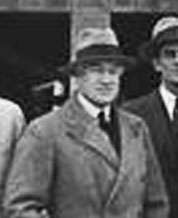John Chancellor (colonial administrator)
| Sir John Chancellor GCMG, GCVO, GBE, DSO | |
|---|---|
 Chancellor in Palestine, 1931 | |
| Born |
20 October 1870 Edinburgh, United Kingdom |
| Died |
31 July 1952 (aged 81) Shieldhill Castle, Lanarkshire, United Kingdom |
| Allegiance | British |
| Service/ | Army |
| Rank | Lieutenant Colonel |
| Unit | Corps of Royal Engineers |
| Awards | Distinguished Service Order, Companion of the Order of St Michael and St George, Knight Commander of the Order of St Michael and St George |
| Relations | Alexander Chancellor |
| Other work | Colonial administrator |

Lieutenant Colonel Sir John Robert Chancellor GCMG, GCVO, GBE, DSO (20 October 1870 – 31 July 1952)[1] was a British soldier and colonial official.
Biography
After a career in the British Army's Corps of Royal Engineers,[2][3] which included service on the North West Frontier[4] and being Secretary of the Colonial Defence Committee,[5] he became a colonial administrator serving as the 20th Governor of Mauritius from 13 September 1911[6] to 28 January 1916,[7] Trinidad and Tobago (1916[8]–1921) and Southern Rhodesia (1923–1928). He also served as Principal Assistant Secretary to the Committee of Imperial Defence From 1922–1923.[9]
In 1898 he was awarded the Distinguished Service Order (DSO).[4] In 1909 he was appointed a Companion of the Order of St Michael and St George.[5] He was knighted in the 1913 King's Birthday Honours when he was made a Knight Commander of the Order of St Michael and St George (KCMG).[10] In the 1922 Dissolution Honours List he was promoted to Knight Grand Cross of the Order of St Michael and St George (GCMG).[11] He was appointed a Knight of Justice in the Venerable Order of Saint John on 19 December 1928.[12]
High Commissioner
In 1928, he became High Commissioner of the British Mandate of Palestine, where he was perceived as being cool to Zionism and the Jewish people.[13] Though he admired some Zionist leaders, in particular Pinchas Rutenberg, in general Chancellor's attitude towards Jews was negative.[14] He wrote to his son that "truly the Jews are an ungrateful race".[14] His attitude towards Arabs was politically supportive but paternalistic; he wrote to his son "they are like children, and very difficult to help".[14]
While he was in London in 1929, Arab riots protesting Jewish immigration broke out. On his return, he initially condemned Arab attacks but was subsequently less critical. He helped write the Lord Passfield's White Paper of 1930, which aimed to reinterpret the Balfour Declaration in order to back away from a commitment to the creation of a Jewish state. He left Palestine in 1931.
In 1931, Jerusalem's Straus Street was renamed Chancellor Avenue in his honour. The street reverted to its original name after the 1948 Arab-Israeli War.[15][16]
In 1937 he was appointed chairman of the Livestock Commission, which was set up following the passing of the Livestock Industry Act, 1937.[17] In the 1947 King's Birthday Honours he was created a Knight Grand Cross in the Civil Division of the Order of the British Empire (GBE) for services to the Ministry of Agriculture and Fisheries.[18]
Legacy
Chancellor Avenue in Salisbury, Southern Rhodesia, now Harare, Zimbabwe, was named after him and still bears his name.[19] However, his grandson, Alexander Chancellor, suggested that it be changed on account of it now being the street on which Robert Mugabe, President of Zimbabwe now lives.[20]
References
- ↑ Profile of Sir John Robert Chancellor
- ↑ "No. 26076". The London Gazette. 5 August 1890. p. 4283.
- ↑ "No. 26428". The London Gazette. 1 August 1893. p. 4356.
- 1 2 "No. 26968". The London Gazette. 20 May 1898. p. 3166.
- 1 2 "No. 28305". The London Gazette (Supplement). 5 November 1909. p. 8240.
- ↑ "No. 28517". The London Gazette. 28 July 1911. p. 5632.
- ↑ "Archived copy". Archived from the original on 9 June 2009. Retrieved 2016-03-25.
- ↑ "No. 29516". The London Gazette. 21 March 1916. p. 3065.
- ↑ "No. 32598". The London Gazette. 3 February 1922. p. 978.
- ↑ "No. 28724". The London Gazette. 30 May 1913. p. 3905.
- ↑ "No. 32766". The London Gazette (Supplement). 10 November 1922. p. 8017.
- ↑ "No. 33453". The London Gazette. 1 January 1929. p. 49.
- ↑ Anita Shapira (2012). Israel: A History. Brandeis University Press. p. 79. ISBN 9781611683523.
- 1 2 3 Evyatar Friesel (1993). "Through a Peculiar Lens: Zionism and Palestine in British Diaries, 1927-31". Middle Eastern Studies. 29 (3): 419–44. doi:10.1080/00263209308700959.
- ↑ Katz, D. (1 October 2011). "Pizza, Shnitzel and the Fog of War: Some Impressions of a Recent Visit to Israel". wherewhatwhen.com. Archived from the original on 9 February 2013. Retrieved 31 January 2012.
- ↑ Ronnen, Meir. "The Life and Death of Jaffa Road". The Jerusalem Post. Retrieved 31 January 2012.
- ↑ "No. 34420". The London Gazette. 23 July 1937. p. 4743.
- ↑ "No. 37977". The London Gazette (Supplement). 6 June 1947. p. 2582.
- ↑ Notebook, The Spectator, 30 September 1983, page 5
- ↑ Despite Mugabe's hatred of British colonialism, the road he lives in is still named after my grandfather, The Guardian, 27 June 2008
External links
| Government offices | ||
|---|---|---|
| Preceded by Sir Cavendish Boyle |
Governor of Mauritius 1911–1916 |
Succeeded by Sir Henry Hesketh Joudou Bell |
| Preceded by George Le Hunte |
Governor of Trinidad and Tobago 1916–1921 |
Succeeded by Sir Samuel Herbert Wilson |
| Preceded by Percy Donald Leslie Flynn (acting administrator) |
Governor of Southern Rhodesia 1923–1928 |
Succeeded by Murray Bisset (acting) |
| Preceded by Sir Harry Charles Luke (acting) |
High Commissioner of Palestine 1928–1931 |
Succeeded by Sir Mark Aitchison Young (acting) |